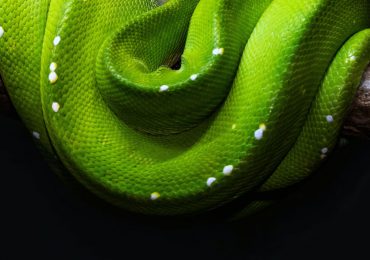The JRB presents new short fiction by Eckard Smuts.
Let The Worms Have It
By Eckard Smuts
8-45 When using insects and arachnids, the standard of care for the particular species being used must include housing, feeding and protection from environmental dangers such as heat, humidity, and cold and inclement weather.
—From the American Humane Association’s ‘Guidelines for the Safe Use of Animals in Filmed Media’
I met Bienvenu on the set of a horror shoot we were doing for a French director in an old warehouse in Montagu Gardens. He was a worm wrangler: his job was to put worms on the bodies of extras who’d been made up to look undead. Between takes, he kept the worms in a big blue toolbox filled with dried grass and veggie scraps. One compartment for mealworms, another one for red wigglers. I’d scored a PA job on the set through my aunt, who knew the local production manager, and having seen some of the dailies, I can tell you that the effect of the stripy, coffee-coloured mealworms squirming between a mass of pulsating wigglers was pure cinematic art. The zombie extras weren’t too happy about being covered with worms, but when they saw the way Bienvenu treated his little creatures, coaxing them to squiggle with just the right amount of torque, making sure each one got safely back in the box, and so on, it made things a little easier for them.
Part of my duties was to lock up the warehouse once everyone had left. One afternoon near the end of the shoot, I snapped shut the giant padlock and turned around to find Bienvenu on the sidewalk, waiting for a taxi. He was from the DRC, but he’d been in South Africa for almost a decade. First in Joburg, then in Cape Town. A lanky, soft-spoken guy with a wisp of beard and small, round glasses, I guessed him to be in his early twenties, like me. The Alliance Française, where he’d done some part-time work, knew about his worms and had put him in touch with the French art director, which is how he’d landed the gig on set. It was the first time his worms would be on screen.
‘Maybe they’ll become famous. Maybe they’ll win you a worm Oscar one day,’ I said, and he smiled shyly.
I lit up a rollie while we were standing there and offered him a drag, but he declined. The other businesses in the street, panel beaters and furniture depots and a shabby takeaway place where we’d bought samosas during the shoot, had already rolled down their shutters for the day. An empty flatbed truck rattled past, belching exhaust fumes into the crisp March air. Two men came walking by from the direction of Koeberg Road. One of them dragged a stick behind him, clanging it every few steps against the palisade fence bordering the sidewalk. The other man, who had on a red cap and a torn white T-shirt, stopped to ask me for a cigarette. I hated when people did that, since I had then either to roll them one, or stand by awkwardly while they handled my papers and tobacco. So I brushed him off. Maybe I shouldn’t have done that. Lifting the flap of his cap, he said something to Bienvenu. But Bienvenu, who spoke mainly French, understood as little of what the man said as I did. He repeated himself, more loudly. Bienvenu shifted uncomfortably.
The man with the stick, who’d been waiting up ahead, sauntered closer. Red Cap jabbed a finger in Bienvenu’s chest. ‘Laissez-moi!’ Bienvenu said softly, clutching his toolbox. I knew a bit of French since I’d taken it as a subject in high school, but it wasn’t necessary to understand the words to figure out what was happening here.
Red Cap muttered something to his friend. He seemed angry at the fact that Bienvenu couldn’t understand him. Or maybe he was pissed that I hadn’t given him a cigarette, I don’t know. At any rate, before I knew what was happening, he gave Bienvenu a shove, while his friend grabbed the toolbox. ‘Hey!’ I said. Red Cap shot me a glance, drawing his hand across his throat in a slitting gesture. I took a step back.
Bienvenu tried to take back his box, but the men pushed him away and he fell to the ground. Right there, in plain view, they pried open the toolbox. Red Cap stuck his hand into the earthy mix. He frowned and, with a groan, smacked the box to the sidewalk. A tangled mess of wigglers spilled out, and a good portion of mealworms. The men set about stomping on the creatures, pulverizing them into the concrete.
‘Mes vers!’ Bienvenu shouted from where he lay. But his assailants ignored him. Brusquely, as if nothing had happened, they walked off. At the bottom of the road, before they disappeared around the corner, the man with the stick banged it loudly against a stop sign.
I gave Bienvenu a hand up. He hurried to his worms. Trying to hide my disgust at the mush of writhing worm splatter, I helped him pick out survivors and put them back in the box. In truth, I was feeling embarrassed about my cowardly behaviour. I had simply stood by while the men had terrorised him. ‘Listen, can I give you a lift home? Where do you live?’ I asked. Bienvenu, clasping shut his worm box and brushing off his clothes, simply nodded. We were both shaken.
His home, it turned out, wasn’t too far away, in Table View. I could drop him off and still get back to the city before dark. There was a message on my phone from Belinda, my girlfriend, but I didn’t read it. ‘I’m sorry about what happened back there, man,’ I said when we stopped at a traffic light near the large refinery on the M5. The sky was turning purple, and the people selling planters beside the road were packing up their wares. A putrid chemical smell, like a potent fart concentrate, wafted in from the petroleum works.
‘Why are you sorry? You didn’t do anything,’ Bienvenu said. His worm box was on his lap. He pressed a tissue to his palm, which he’d scraped earlier when he’d tried to block his fall on the concrete. Precisely, I thought, but I kept it to myself. My phone rang—Belinda again—but I ignored it.
We stopped in front of a row of townhouses, neat enough but crying out for a coat of paint. Bienvenu’s mother opened the door. She was young—not yet out of her forties, I guessed. Bienvenu had clearly inherited his slim features from her. She wore a colourfully patterned shirt tucked into a high-waisted jean. Bienvenu didn’t say anything about being terrorised on the street, and if she was surprised that a stranger had given her son a lift home, she didn’t show it. ‘Come in for a cup of tea,’ she said, keeping her head turned at an awkward angle, so that she seemed to be speaking from the side of her mouth.
I followed them inside. ‘Why don’t you come and see my worm farm?’ Bienvenu offered. He led me through a sliding door into a tiny, square-shaped backyard. Beside a wall on which granadillas hung in trusses stood a large, tiered wooden structure, almost like a beehive but much bulkier. Bienvenu lifted the lid and, picking out the surviving wigglers one by one from his toolbox, lowered them into the dank interior.
‘That’s cool, man,’ I said. ‘What about the mealworms?’
He smiled and patted the toolbox. ‘They live inside, in a special box in my room.’ For the first time since the men had rough-handled him, the tension seemed to lift from his shoulders.
His mother—Mrs Matonge, Bienvenu had introduced her—stood in the doorway, holding a tray of tea things. We went inside. The furniture was cheap, but not tacky. Bienvenu and I sat on a dark brown pleather couch. Mrs Matonge sat beneath a black-and-white wedding portrait of herself and a serious-looking young man whom I took to be Bienvenu’s father. We chatted for a while, sipping tea. She asked me about my studies—filmmaking, of course—and exclaimed how surprised she was that her son seemed to have a thing for worms. All the while she sat speaking with her head turned to one side, showing me her face only in profile.
When I left, refusing an invitation to dinner, Bienvenu walked me back to my car. The evening air carried a whiff of brine from the ocean. Mrs Matonge called out from the front door, saying something to her son in French. When she turned to go back in, I thought I saw a glimpse of the side of her head which she had, I realised, done her utmost to conceal from me. It looked webbed and oddly featureless, as if someone had tried to pleat together the shape of a human face from raw materials but had had to stop before they could finish.
I looked away, and got into my car.
‘Let me know if you need worms again, when you are a famous director one day,’ Bienvenu joked as he waved me off. ‘My mother says you are welcome to visit anytime.’
‘Sure thing, bud,’ I said. We were done with the zombie part of the shoot, and I didn’t know if I would see him again. Driving off, I took a pre-rolled ciggie from the cubby and lit it, blowing smoke into the passing dusk.
When I got back to our flat in Gardens, Belinda sat on the balcony, drinking a glass of red wine. ‘Welcome home, babe,’ she said. ‘There’s a surprise for you in the bathroom.’
I went to have a look. In the bathtub, trapped beneath an upturned ice cream container, was a giant rain spider.
‘What do you want me to do with it?’ I asked, pouring myself a glass from the open bottle on the counter.
She shrugged. ‘All I know is I’m not going in there again as long as it’s alive. And I need to wee.’ Across the bay, the lights of Milnerton and Bloubergstrand gleamed, a neon crust on the dark earth. Stars had begun to flicker above Lion’s Head. We both lit cigarettes.
Before dinner, I slid a newspaper under the ice cream tub in the bath and, flipping it over, carried the trapped spider down the stairs to the garden. I flung it into the bushes beside the garden path. When I was halfway up the stairs again, I heard a scream from Mrs Bezzoli, who lived in the large corner flat on the ground floor. I rushed down to see her stomping on something on her porch. The rain spider, not happy with the prospect of spending a night in the bushes, had scuttled back towards the building. By the time I got there, it lay scrunched up in a tiny heap.
‘Ah, no, what did you do that for, Mrs Bezzoli?’ I asked.
She glared at me. She was wearing a night robe and puffy slippers. ‘Vermin,’ she said simply and went back inside.
I scooped up the crumpled spider and tipped it back into the ice cream tub. Then I carried it to the compost heap behind the building, where I tossed it onto a pile of carrot peels.
Let the worms have it, I thought.
~~~
- Eckard Smuts lectures in the Department of English at Stellenbosch University. His writing has appeared in The Johannesburg Review of Books, Daily Maverick, Business Day, and Go! Magazine, among other places. Follow him on Instagram or Twitter.





